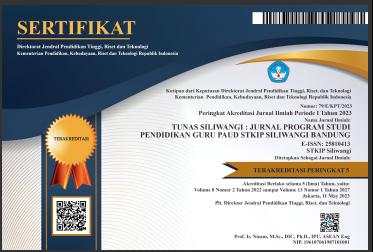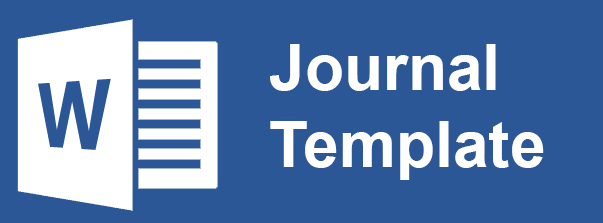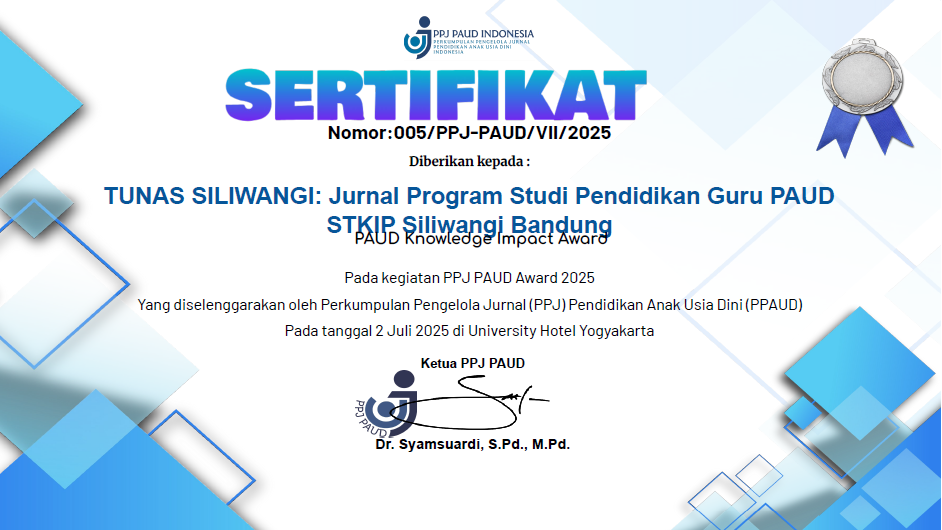Application of the ummi method in teaching early childhood to read the Qur’an at Sabiilul Khoirat Qur’anic Preschool Cilimus
DOI:
https://doi.org/10.22460/ts.v11i2.6500Keywords:
UMMI Method, Al-Quran, Early Childhood EducationAbstract
Even though the majority of Indonesia's population is Muslim, the country nevertheless faces a significant problem with illiteracy in reading the Qur'an. This study aims to describe the implementation of the Ummi Method at Sabiilul Khoirat Qur’anic Preschool, Cilimus, and to identify supporting and inhibiting factors. Using a descriptive qualitative design, data were collected through documentation, interviews, and observations involving the principal, eight certified teachers, and parents. The results show that Qur’anic learning is conducted systematically every Monday to Thursday from 08.00–09.00 AM using classical, read-and-listen, and individualized methods. Children progress through Ummi volumes 1–6, with advanced learners focusing on tajwid and makharijul huruf. The findings indicate that approximately 90% of Group B children successfully memorized 15 short surahs and were able to read the Qur’an with correct pronunciation. Overall, the Ummi Method has proven effective in improving children’s Qur’anic literacy and fostering enthusiasm for learning the Qur’an.
References
Al Muiz, M. N., & Umatin, C. (2022). Upaya Peningkatan Kemampuan Membaca Al-Quran Santri Melalui Metode Ummi di Pesantren Pelajar Al-Fath Kediri. Edudeena : Journal of Islamic Religious Education, 6(1), 78–86. https://doi.org/10.30762/ed.v6i1.518
Alucyana, A., Raihana, R., & Utami, D. T. (2020). Peningkatan Kemampuan Membaca Huruf Hijaiyah Melalui Kartu Huruf Hijaiyah di PAUD. Al-Hikmah: Jurnal Agama Dan Ilmu Pengetahuan, 17(1), 46–57. https://doi.org/10.25299/al-hikmah:jaip.2020.vol17(1).4638
Aprida, S. N., & Suyadi, S. (2022). Implementasi Pembelajaran Al-Qur’an Terhadap Perkembangan Nilai Agama dan Moral Anak Usia Dini. Jurnal Obsesi : Jurnal Pendidikan Anak Usia Dini, 6(4), 2462–2471. https://doi.org/10.31004/obsesi.v6i4.1959
Ardiansyah, Risnita, & Jailani, M. S. (2023). Teknik Pengumpulan Data dan Instrumen Penelitian Ilmiah Pendidikan Pada Pendekatan Kualitatif dan Kuantitatif. Jurnal IHSAN : Jurnal Pendidikan Islam, 1(2), 1–9. https://doi.org/10.61104/ihsan.v1i2.57
Haryato, S., Sumayah, S., & Waloyo, T. (2024). Strategi Kepala Sekolah dalam Meningkatkan Hubungan Harmonis Dengan Masyarakat Guna Peningkatan Mutu Sekolah. Manajemen Pendidikan, 19(1), 156–168. https://doi.org/10.23917/jmp.v19i1.4329
Hesti Anjani Wau, D. H., & Sarumaha, R. (2022). Analisis Kemampuan Penalaran Matematis Pada Materi Barisan dan Deret Siswa Kelas Xi SMK Negeri 1 Toma Tahun Pembelajaran 2020/2021. 6(19), 97–111. https://doi.org/10.57094/afore.v1i1.435
Junaidin Nobisa, & Usman. (2021). Pengunaan Metode Ummi dalam Pembelajaran Al-Qur’an. AL-FIKRAH: Jurnal Studi Ilmu Pendidikan Dan Keislaman, 4(1), 44–70. https://doi.org/10.36835/al-fikrah.v4i1.110
Najwa Sabilla, Ummu Zainab, F. A. (2025). Analisis Penerapan Metode Ummi dalam Meningkatkan Kemampuan Membaca Al-Qur’an. 2, 210–222. https://doi.org/10.63477/jose.v2i2.210
Nurachadijat, K., & Selvia, M. (2023). Peran Lembaga Pendidikan Anak Usia Dini dalam Implementasi Kurikulum dan Metode Belajar Pada Anak Usia Dini. Jurnal Inovasi, Evaluasi Dan Pengembangan Pembelajaran (JIEPP), 3(2), 57–66. https://doi.org/10.54371/jiepp.v3i2.284
Rifa’i, Y. (2023). Analisis Metodologi Pengumpulan Data di Penelitian Ilmiah. Cendekia Inovatif Dan Berbudaya, 1(1), 31–37. https://doi.org/https://doi.org/10.59996/cendib.v1i1.155
Rosyad, M. F. U., Azzahrina, K., Kibtiyah, M., & Basyar, K. (2024). Bimbingan Agama dalam Meretas Buta Huruf Hija ’ iyah. 1(2), 124–131. https://doi.org/10.28918/dharmahita.v1i2.8996
Sabdan Tanjung, D. S. T., Ayu, A., Br. Rambe, S. W. T., Lestari, S. I., & Farida, F. (2023). Upaya Meningkatkan Kesadaran Masyarakat untuk Mengurangi Buta Huruf Al-Qur’an di Desa Marbau Selatan. Reslaj : Religion Education Social Laa Roiba Journal, 5(4), 1086–1098. https://doi.org/10.47467/reslaj.v5i4.2127
Sulistiyarini, E., Hartinah, S., & Purwanto, B. E. (2024). Peran Kepemimpinan Kepala Sekolah dalam Meningkatkan Mutu Sekolah di Sekolah Dasar. Journal of Education Research, 5(3), 3888–3901. https://doi.org/10.37985/jer.v5i3.1514
Susanto, D., Risnita, & Jailani, M. S. (2023). Teknik Pemeriksaan Keabsahan Data Dalam Penelitian Ilmiah. Jurnal QOSIM Jurnal Pendidikan Sosial & Humaniora, 1(1), 53–61. https://doi.org/10.61104/jq.v1i1.60
Syaikhu, A. (2022). Implementasi Metode UMMI dalam Pembelajaran Al-Quran di MI As Sunniyyah Lumajang. Auladuna, 8(2), 39–55. https://doi.org/10.36835/au.v4i01.1117
Waruwu, M., Pu`at, S. N., Utami, P. R., Yanti, E., & Rusydiana, M. (2025). Metode Penelitian Kuantitatif: Konsep, Jenis, Tahapan dan Kelebihan. Jurnal Ilmiah Profesi Pendidikan, 10(1), 917–932. https://doi.org/10.29303/jipp.v10i1.3057
Yulina, F. D., Ana, S., & Salma, K. N. (2023). Pendampingan Belajar Membaca Al-Qur’an Dengan Metode Ummi Pada Anak Usia 7-12 Tahun di TPQ Darussalam, Dusun Pacar, Desa Prajegan. Social Science Academic, 1(2023), 123–131. https://doi.org/10.37680/ssa.v0i0.5934
Downloads
Published
Issue
Section
License
Copyright (c) 2025 Rusmianti Rusmianti, Sopian Asep Nugraha

This work is licensed under a Creative Commons Attribution-ShareAlike 4.0 International License.
The author is responsible for acquiring the permission(s) to reproduce any copyrighted figures, tables, data, or text that are being used in the submitted paper. Authors should note that text quotations of more than 250 words from a published or copyrighted work will require grant of permission from the original publisher to reprint. The written permission letter(s) must be submitted together with the manuscript.







